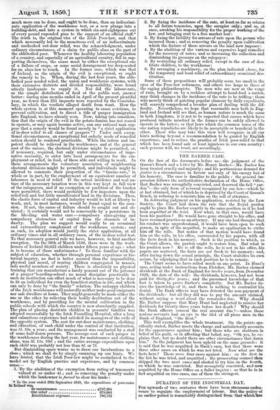THE BARBER CASE.
ON the face of the documents before us—the judgment of the Queen's Bench and a letter by Mr. Henry Barber—Mr. Barber has been treated cruelly and unjustly; and his pertinacious demand for justice is a circumstance in favour not only of his energy but of his honesty. The case is familiar to the public : the general im- pression follows the authoritative declaration of the Home Office, that Barber was wrongfully convicted, and deserved the full "par don"—the only form of reversal recognized by our law—which he at last obtained, but of which he is deprived by the Court of Queens Bench, in refusing to reinstate him on the roll of attoznies.
In delivering judgment on his application, resisted by the Law Society, the Court laid down the rule that the Royal pardon ought to place Mr. Barber exactly in the same position as if he had been acquitted at the trial. Now what, in that ease, would have been his position ? He would have gone straight to his office, and have resumed practice as an attorney. If any one had thought that his conduct was unprofessional, it would have been open to such person, in spite of the acquittal, to make an application to strike him off the rolls. But notice of that motion would have found him on the rolls, in his office, surrounded by his papers, with all the facts fresh in his memory. Such is the position to which, as the Court allows, the pardon ought to restore him. But what is his position now ? He is off the rolls, he is not in his office, his papers are scattered, the facts are not fresh in his memory; and, after laying down the sound principle, the Court stultifies its own axiom, by adjudging that in such position he is to remain. The Court seems to have relied much on one point. In Hunts case, acting under instructions from Fletcher, Mr. Barber claimed dividends at the Bank of England for twelve years, from December 1829, the date of the will : the dividends, however, had not been paid for thirty-five years ; and the presumed knowledge of that fact is taken to prove Barber's complicity. But Mr. Barber de- nies the knowledge of it, and there is nothing to contradict his denial. The Bank officers may have detected the non-payment of the dividends : but all they did was to pay the amount claimed, without saying a word about the remainder due. Why should Mr. Barber suppose that Mary Hunt had neglected to receive her dividends for twenty-three years before her death ? Why should the Bank officers conceal the real amount due ?—unless those zealous servants had an eye to the idol of all pious men in the Bank of England, "the Rest."
This well exemplifies the whole treatment. On the points spe- cifically stated, Barber meets the charge and satisfactorily accounts for the appearances against him ; but those who are stubborn in belief of his guilt, or in affecting that belief, say, "Oh yes, he ex- plains that; but no doubt there are other circumstances that damn him." So the judgment has been upheld on the same grounds : it is said that he was acquitted in Slack's case, but that there were three other cases on which he was not tried. Now what are the facts here ? There were four cases against him : on the first in the list he was tried, and acquitted ; the prosecuting counsel then skipped the two next cases and elected to try him on the fourth, on which he was convicted. But wrongfully convicted, and now acquitted by the Home Office on a fuller inquiry : so that he is in fact acquitted on two eases, one of them the strongest.


























 Previous page
Previous page